外研版(2019)选择性必修第四册Unit 6 Space and Beyond Grammar 课件(共24张PPT)
文档属性
| 名称 | 外研版(2019)选择性必修第四册Unit 6 Space and Beyond Grammar 课件(共24张PPT) |
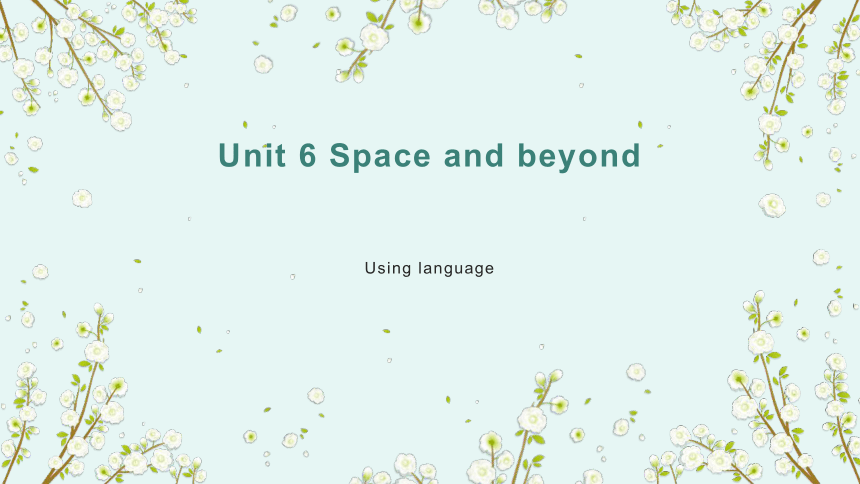
|
|
| 格式 | pptx | ||
| 文件大小 | 1.8MB | ||
| 资源类型 | 教案 | ||
| 版本资源 | 外研版(2019) | ||
| 科目 | 英语 | ||
| 更新时间 | 2024-06-04 00:00:00 | ||
图片预览



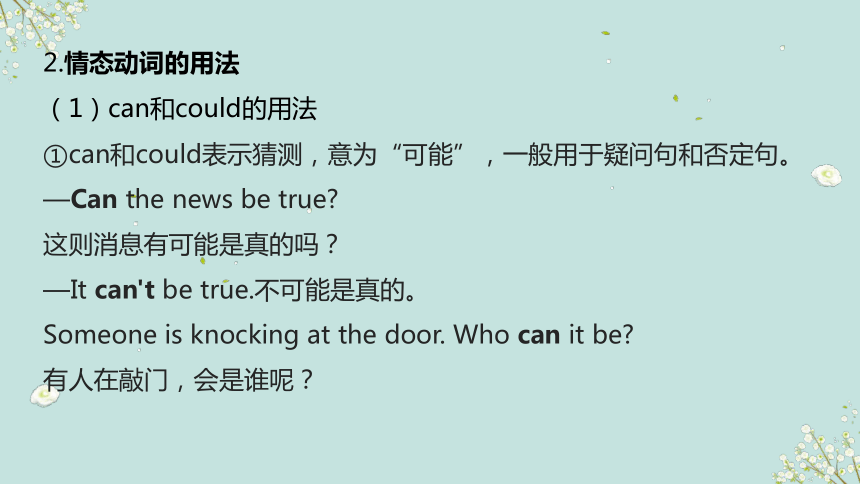

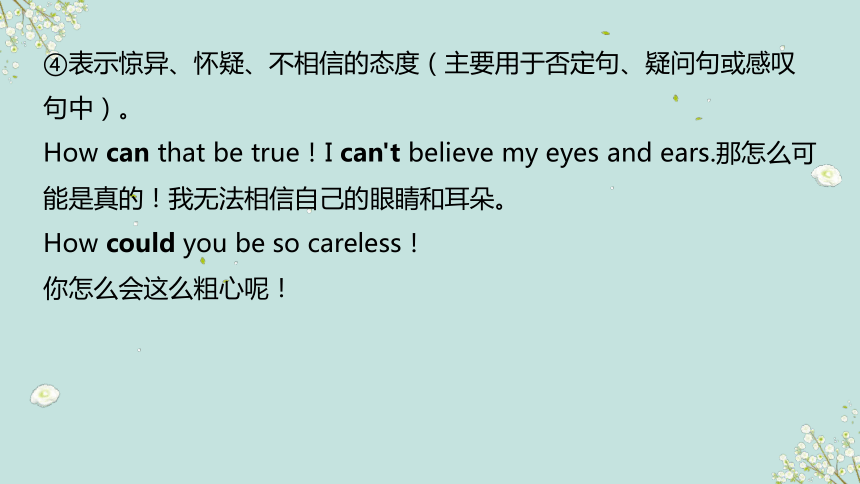
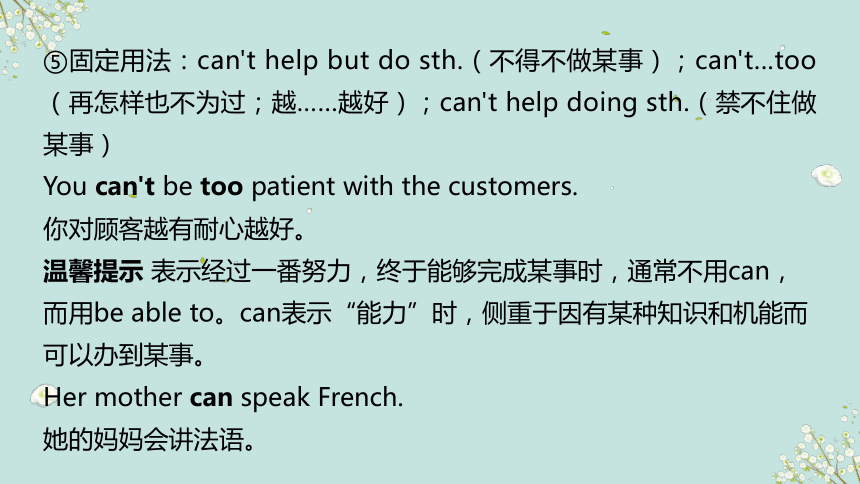
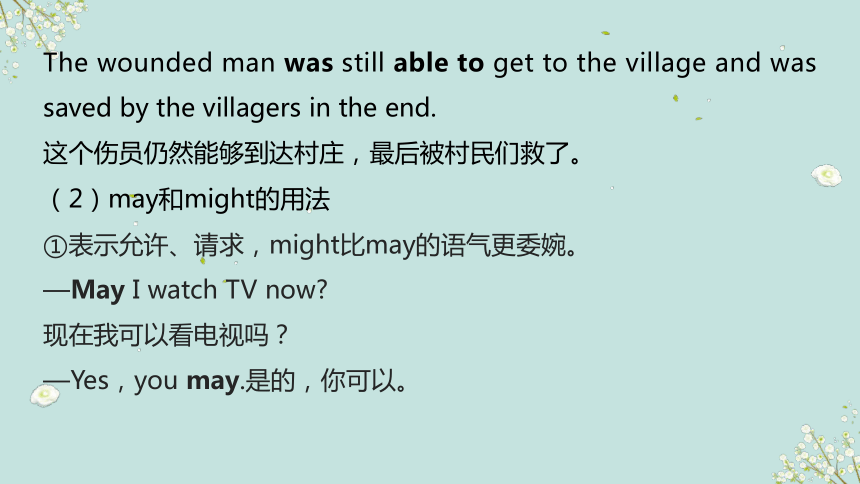

文档简介
(共24张PPT)
Unit 6 Space and beyond
Using language
语法点拨
PART.01
1.概述
情态动词主要用于表明说话者的情感、态度和语气。情态动词不能单独作谓语,需要和实义动词的原形一起构成谓语。常见的情态动词有can、could、will、would、may、might、must、need、should等。
2.情态动词的用法
(1)can和could的用法
①can和could表示猜测,意为“可能”,一般用于疑问句和否定句。
—Can the news be true
这则消息有可能是真的吗?
—It can't be true.不可能是真的。
Someone is knocking at the door. Who can it be
有人在敲门,会是谁呢?
②can可用于肯定句中,表示理论上的可能性,指偶尔发生的行为或情形,意为“有时会”。
Anybody can make mistakes.
任何人都会犯错误。
③表示请求时,口语中常用could代替can,使语气更委婉,回答时用can。
—Could I come to see you tomorrow
明天我可以来看你吗?
—Yes, you can.是的,你可以。
④表示惊异、怀疑、不相信的态度(主要用于否定句、疑问句或感叹句中)。
How can that be true!I can't believe my eyes and ears.那怎么可能是真的!我无法相信自己的眼睛和耳朵。
How could you be so careless!
你怎么会这么粗心呢!
⑤固定用法:can't help but do sth.(不得不做某事);can't...too(再怎样也不为过;越……越好);can't help doing sth.(禁不住做某事)
You can't be too patient with the customers.
你对顾客越有耐心越好。
温馨提示 表示经过一番努力,终于能够完成某事时,通常不用can,而用be able to。can表示“能力”时,侧重于因有某种知识和机能而可以办到某事。
Her mother can speak French.
她的妈妈会讲法语。
The wounded man was still able to get to the village and was saved by the villagers in the end.
这个伤员仍然能够到达村庄,最后被村民们救了。
(2)may和might的用法
①表示允许、请求,might比may的语气更委婉。
—May I watch TV now
现在我可以看电视吗?
—Yes,you may.是的,你可以。
②表示可能性时,might比may的语气弱。
The story may not be true.
这个故事可能不是真的。
③表示祝愿(May+主语+动词原形!)。
May you succeed!祝你成功!
④固定用法:may/might as well(还是……为好;不妨);may/might well(很可能)
You might as well do it now.
你还是现在做这件事为好。
He may well be late for class.
他很可能会上课迟到。
(3)must和have to的用法
①must表示“必须,应该,一定要”,强调主观看法,have to着重客观需要,能用于多种时态。以must开头的问句,其否定回答要用needn't或don't have to。
I must go now. 我必须走了。
He will have to be there before ten.
10点前他必须到那儿。
②must表示肯定的推测,意为“一定是”,只用于肯定句。
All men must die.人都会死的。
③must还可表示讥讽、不耐烦等感彩。
If you must smoke, use an ashtray.
如果你硬要吸烟,就用个烟灰缸。
④mustn't表示禁止,意为“不可以;一定不要”。
You mustn't play with the knife, or you may hurt yourself.
你不能拿着刀玩,不然你会伤到自己。
(4)need和dare的用法
①need作情态动词,表示“需要”,一般用于否定句和疑问句中。need作实义动词表“需要”时,作宾语的动名词用主动形式表示被动意义。
—Need we come 需要我们来吗?
—No, you needn't.不,你们不必来。
The desk needs repairing.
这张课桌需要修理。
②dare作情态动词,表示“敢”,通常用于否定句和疑问句中。作实义动词时,在肯定句中要接to,在疑问句和否定句中to可省去。
Dare you go home alone at eleven in the evening
晚上11点你敢独自一人回家吗?
He dares to catch a snake.他敢捉蛇。
I do not dare (to) complain.我不敢抱怨。
Do you dare (to) swim in the river
你敢在河里游泳吗?
(5)will和would的用法
①表示意志、意愿或决心。will指现在,would指过去。
I will never do that again.
我决不再做那件事了。
②表示请求、建议,常用于第二人称作主语的疑问句中。would比will语气委婉。
Will you take out the trash
你可以把垃圾带出去吗?
③表示习惯性动作或某种倾向,意为“总是,惯于”。will指现在,would指过去。
We would play badminton on Sundays.
我们过去总是在周日打羽毛球。
(6)shall、should和ought to的用法
①shall用于主语为第一、三人称的疑问句中时,在问句中表示征求对方的意见或请求;用于主语为第二、三人称的陈述句中时,表示命令、威胁、决心等;用于条约、规定、法令、法律等文件中时,意为“必须”。
Shall I come in
我可以进来吗?
You shall do as your father says.
你要按你父亲说的做。
②should表示责任、义务,意为“应该”;表示惊讶语气,意为“竟然”。
You should always focus on quality, not quantity.
你应该总是关注质量,而不是数量。
It's strange that you should wear slippers in class.
奇怪的是,你竟然在课堂上穿拖鞋。
③ought to表示义务、责任、劝告等,意为“应该”,比should语气要强。
You ought to take care of yourself.
你应该照顾自己。
④用于if引导的条件状语从句时,表示“假如,万一”,省去if,should可提至句首。
Should you be late,apologize to the teacher.
如果你迟到了,就要向老师道歉。
3.“情态动词+have done”的用法(以do为例)
(1)表示对过去发生的事情或状态进行推测
must have done sth. “过去一定做了某事”,语气比较肯
定,用于肯定句中
may(might)have done sth. “过去可能做了某事”,语气不确定,
用于肯定句和否定句中
can(could)not have done sth. “过去不可能做某事”,用于否定句和
疑问句中。
(2)表示与过去事实相反
could have done sth. 过去本可以做某事但实际上没做
might have done sth. 过去本可能做某事但实际上没做
should/ought to have done 过去本来应该做某事而实际上未做
shouldn't/ought not to have done 过去本不应该做某事而实际上做了
needn't have done 过去本没有必要做某事而实际上做了
You should/ought to have told me about it earlier.
你本该早点儿告诉我此事的。
You shouldn't/ought not to have said such words to your parents.
你本不该对你父母说那样的话。
You needn't have walked so quickly since time was enough.
你本不必走这么快的,因为时间足够。
练习
单句填空
1. These flowers have died. You _______have watered them.
should
2. __________ you tell me what time it is, please
Could/Can
3. Henry ______ walk when he was one year old.
could
4. We are going for a walk. _______ you like to join us
Would
5. _____she be ten years old next month
Will
6. The road is wet. It ______ have rained last night.
must
7. He has waited outside for half an hour. ______ he come in
Shall
8. I __________ have hurt your feelings but it was not my intention.
may/might
9. —What ____ it be
—It _____ be a desk, for it is moving. It ______ be a car.
can
can't
must
10. I love the weekend, because I _______ get up early on
Saturdays and Sundays.
needn't
Thank you
Unit 6 Space and beyond
Using language
语法点拨
PART.01
1.概述
情态动词主要用于表明说话者的情感、态度和语气。情态动词不能单独作谓语,需要和实义动词的原形一起构成谓语。常见的情态动词有can、could、will、would、may、might、must、need、should等。
2.情态动词的用法
(1)can和could的用法
①can和could表示猜测,意为“可能”,一般用于疑问句和否定句。
—Can the news be true
这则消息有可能是真的吗?
—It can't be true.不可能是真的。
Someone is knocking at the door. Who can it be
有人在敲门,会是谁呢?
②can可用于肯定句中,表示理论上的可能性,指偶尔发生的行为或情形,意为“有时会”。
Anybody can make mistakes.
任何人都会犯错误。
③表示请求时,口语中常用could代替can,使语气更委婉,回答时用can。
—Could I come to see you tomorrow
明天我可以来看你吗?
—Yes, you can.是的,你可以。
④表示惊异、怀疑、不相信的态度(主要用于否定句、疑问句或感叹句中)。
How can that be true!I can't believe my eyes and ears.那怎么可能是真的!我无法相信自己的眼睛和耳朵。
How could you be so careless!
你怎么会这么粗心呢!
⑤固定用法:can't help but do sth.(不得不做某事);can't...too(再怎样也不为过;越……越好);can't help doing sth.(禁不住做某事)
You can't be too patient with the customers.
你对顾客越有耐心越好。
温馨提示 表示经过一番努力,终于能够完成某事时,通常不用can,而用be able to。can表示“能力”时,侧重于因有某种知识和机能而可以办到某事。
Her mother can speak French.
她的妈妈会讲法语。
The wounded man was still able to get to the village and was saved by the villagers in the end.
这个伤员仍然能够到达村庄,最后被村民们救了。
(2)may和might的用法
①表示允许、请求,might比may的语气更委婉。
—May I watch TV now
现在我可以看电视吗?
—Yes,you may.是的,你可以。
②表示可能性时,might比may的语气弱。
The story may not be true.
这个故事可能不是真的。
③表示祝愿(May+主语+动词原形!)。
May you succeed!祝你成功!
④固定用法:may/might as well(还是……为好;不妨);may/might well(很可能)
You might as well do it now.
你还是现在做这件事为好。
He may well be late for class.
他很可能会上课迟到。
(3)must和have to的用法
①must表示“必须,应该,一定要”,强调主观看法,have to着重客观需要,能用于多种时态。以must开头的问句,其否定回答要用needn't或don't have to。
I must go now. 我必须走了。
He will have to be there before ten.
10点前他必须到那儿。
②must表示肯定的推测,意为“一定是”,只用于肯定句。
All men must die.人都会死的。
③must还可表示讥讽、不耐烦等感彩。
If you must smoke, use an ashtray.
如果你硬要吸烟,就用个烟灰缸。
④mustn't表示禁止,意为“不可以;一定不要”。
You mustn't play with the knife, or you may hurt yourself.
你不能拿着刀玩,不然你会伤到自己。
(4)need和dare的用法
①need作情态动词,表示“需要”,一般用于否定句和疑问句中。need作实义动词表“需要”时,作宾语的动名词用主动形式表示被动意义。
—Need we come 需要我们来吗?
—No, you needn't.不,你们不必来。
The desk needs repairing.
这张课桌需要修理。
②dare作情态动词,表示“敢”,通常用于否定句和疑问句中。作实义动词时,在肯定句中要接to,在疑问句和否定句中to可省去。
Dare you go home alone at eleven in the evening
晚上11点你敢独自一人回家吗?
He dares to catch a snake.他敢捉蛇。
I do not dare (to) complain.我不敢抱怨。
Do you dare (to) swim in the river
你敢在河里游泳吗?
(5)will和would的用法
①表示意志、意愿或决心。will指现在,would指过去。
I will never do that again.
我决不再做那件事了。
②表示请求、建议,常用于第二人称作主语的疑问句中。would比will语气委婉。
Will you take out the trash
你可以把垃圾带出去吗?
③表示习惯性动作或某种倾向,意为“总是,惯于”。will指现在,would指过去。
We would play badminton on Sundays.
我们过去总是在周日打羽毛球。
(6)shall、should和ought to的用法
①shall用于主语为第一、三人称的疑问句中时,在问句中表示征求对方的意见或请求;用于主语为第二、三人称的陈述句中时,表示命令、威胁、决心等;用于条约、规定、法令、法律等文件中时,意为“必须”。
Shall I come in
我可以进来吗?
You shall do as your father says.
你要按你父亲说的做。
②should表示责任、义务,意为“应该”;表示惊讶语气,意为“竟然”。
You should always focus on quality, not quantity.
你应该总是关注质量,而不是数量。
It's strange that you should wear slippers in class.
奇怪的是,你竟然在课堂上穿拖鞋。
③ought to表示义务、责任、劝告等,意为“应该”,比should语气要强。
You ought to take care of yourself.
你应该照顾自己。
④用于if引导的条件状语从句时,表示“假如,万一”,省去if,should可提至句首。
Should you be late,apologize to the teacher.
如果你迟到了,就要向老师道歉。
3.“情态动词+have done”的用法(以do为例)
(1)表示对过去发生的事情或状态进行推测
must have done sth. “过去一定做了某事”,语气比较肯
定,用于肯定句中
may(might)have done sth. “过去可能做了某事”,语气不确定,
用于肯定句和否定句中
can(could)not have done sth. “过去不可能做某事”,用于否定句和
疑问句中。
(2)表示与过去事实相反
could have done sth. 过去本可以做某事但实际上没做
might have done sth. 过去本可能做某事但实际上没做
should/ought to have done 过去本来应该做某事而实际上未做
shouldn't/ought not to have done 过去本不应该做某事而实际上做了
needn't have done 过去本没有必要做某事而实际上做了
You should/ought to have told me about it earlier.
你本该早点儿告诉我此事的。
You shouldn't/ought not to have said such words to your parents.
你本不该对你父母说那样的话。
You needn't have walked so quickly since time was enough.
你本不必走这么快的,因为时间足够。
练习
单句填空
1. These flowers have died. You _______have watered them.
should
2. __________ you tell me what time it is, please
Could/Can
3. Henry ______ walk when he was one year old.
could
4. We are going for a walk. _______ you like to join us
Would
5. _____she be ten years old next month
Will
6. The road is wet. It ______ have rained last night.
must
7. He has waited outside for half an hour. ______ he come in
Shall
8. I __________ have hurt your feelings but it was not my intention.
may/might
9. —What ____ it be
—It _____ be a desk, for it is moving. It ______ be a car.
can
can't
must
10. I love the weekend, because I _______ get up early on
Saturdays and Sundays.
needn't
Thank you
